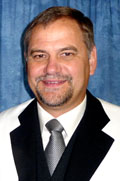 |
| Prof. Kobus Schoeman |
|
Prof. Kobus Schoeman, Head of the Department of Practical Theology at the University of the Free State (UFS), is one of the project leaders of Church Mirror, a unique research project in the family of Dutch Reformed Churches in South Africa.
Over the years Church Mirror has been established as an important source of information for the Dutch Reformed Church. The church is provided with information by means of surveys that assist in reflection on the church as well as congregations’ role and functioning.
The 2010 survey will be no exception. The survey is conducted on the instruction of the General Synod and in collaboration with the Department of Practical Theology at the UFS. This year, the project is also extended to other churches in the Dutch Reformed Church family for the first time.
The questionnaire forms part of the National Church Life Survey, which is done internationally. The questionnaire is completed by everybody who attends a church service on a specific Sunday. Questions that are asked include, “What do the members of the congregation think of their congregation and church services?”, “Are outsiders welcome?” and “Do we care about the community?”
The first survey was done amongst churchgoers at a service in 2006.
Church Mirror is an important research project to outline the profile of mainstream churches in South Africa and it can play a major role in congregations’ planning and reflection upon themselves.